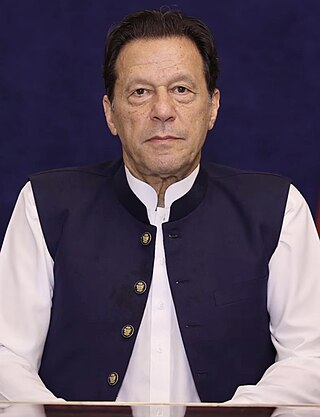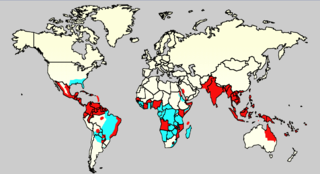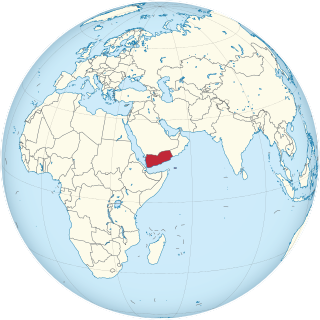Related Research Articles

Imran Ahmed Khan Niazi is a Pakistani politician and former cricketer who served as the 22nd prime minister of Pakistan from August 2018 until April 2022. He is the founder and former chairman of the political party Pakistan Tehreek-e-Insaf (PTI) from 1996 to 2023. He was the captain of the Pakistan national cricket team throughout the 1980s and early 1990s.

The Pakistan Tehreek-e-Insaf is a political party in Pakistan established in 1996 by Pakistani cricketer and politician Imran Khan, who served as the country's prime minister from 2018 to 2022. The PTI ranks among the three major Pakistani political parties alongside the Pakistan Muslim League–Nawaz (PML–N) and the Pakistan People's Party (PPP), and it is the largest party in terms of representation in the National Assembly of Pakistan since the 2018 general election. With a claimed membership of over 10 million in Pakistan, it claims to be one of the country's largest political parties by primary membership.

Fazal-ur-Rehman is a Pakistani politician who is the president of Jamiat Ulema-e-Islam (F). He is also the president of the Pakistan Democratic Movement (PDM), a coalition of political parties which ousted then prime minister Imran Khan through a no-confidence motion in 2022. He has been a member of the National Assembly since February 2024 and previously served in that position between 1988 and 2018. He was also the Leader of the Opposition from 2004 to 2007. He is a supporter of the Taliban government in Afghanistan and has demanded for its international recognition. In the 1980s, he was part of the Movement for the Restoration of Democracy (MRD), which was formed to end the military regime of General Zia-ul-Haq.
Shaukat Khanum Memorial Cancer Hospital and Research Centre (SKMCH&RC) is a cancer centre with locations in Lahore and Peshawar, Pakistan. SKMCH&RC Lahore was the first project of the Shaukat Khanum Memorial Trust, the second one being SKMCH&RC Peshawar.
In the 2006 dengue outbreak in India, cases of dengue fever were reported first from New Delhi in early September and by the end of September other states also started to report deaths. At least 3613 confirmed cases of dengue fever were reported and over 50 people died in the outbreak.

Bilawal Bhutto Zardari is a Pakistani politician who served as the 37th Minister of Foreign Affairs, in office from 27 April 2022 to 10 August 2023. He became the chairman of Pakistan People's Party in 2007 following his mother's assassination. Bilawal belongs to the Bhutto family, a prominent political family of Pakistan and is the son of former Prime Minister Benazir Bhutto and President Asif Ali Zardari, and the grandson of former President Zulfikar Ali Bhutto. Bilawal was a member of the National Assembly of Pakistan from 13 August 2018 till 10 August 2023. He was re-elected as a Member of the National Assembly of Pakistan in the 2024 Pakistani general election from newly formed constituency NA-194 Larkana-I, taking oath in February 2024.

Pakistan is the fifth most populous country in the world with population approaching 225 million. It is a developing country struggling in many domains due to which the health system has suffered a lot. As a result of that, Pakistan is ranked 122nd out of 190 countries in the World Health Organization performance report.

As of 2010, dengue fever is believed to infect 50 to 100 million people worldwide a year with 1/2 million life-threatening infections. It dramatically increased in frequency between 1960 and 2010, by 30 fold. This increase is believed to be due to a combination of urbanization, population growth, increased international travel, and global warming. The geographical distribution is around the equator with 70% of the total 2.5 billion people living in endemic areas from Asia and the Pacific. Many of the infected people during outbreaks are not virally tested, therefore their infections may also be due to chikungunya, a coinfection of both, or even other similar viruses.

Murad Saeed is a Pakistani politician who served as Federal Minister for Communications and Federal Minister for Postal Services from December 2018 to April 2022.
Noor Alam Khan is a Pakistani politician who had been a member of the National Assembly of Pakistan from August 2018 till August 2023. Previously, he was a member of the National Assembly from 2008 to 2013. He was a member of the Pakistan Tehreek-e-Insaf (PTI) from 2018 to 2022 and the Pakistan Peoples Party (PPP) from 2008 to 2018.
Ihtisab March was a protest march led by Imran Khan of the Pakistan Tehreek-e-Insaf against prime minister Nawaz Sharif. The march was in response to the Panama Papers in 2016 and PTI organized it over the claims of corruption of the Sharif family. The march began on 7 August 2016 from Peshawar.

An outbreak of cholera began in Yemen in October 2016. The outbreak peaked in 2017 with over 2,000 reported deaths in that year alone. In 2017 and 2019, war-torn Yemen accounted for 84% and 93% of all cholera cases in the world, with children constituting the majority of reported cases. As of November 2021, there have been more than 2.5 million cases reported, and more than 4,000 people have died in the Yemen cholera outbreak, which the United Nations deemed the worst humanitarian crisis in the world at that time. However, the outbreak has substantially decreased by 2021, with a successful vaccination program implemented and only 5,676 suspected cases with two deaths reported between January 1 and March 6 of 2021.
In the 2017 dengue outbreak in Peshawar, Pakistan, hundreds of incidents of dengue fever were reported in Peshawar in mid-2017. Initially, according to the health department of Khyber Pakhtunkhwa, 4,320 suspected cases were received by Khyber Teaching Hospital Peshawar and 831 were positive. About a dozen people died of dengue, starting in July. Punjab healthcare experts and Peshawar experts worked together to control the dengue epidemic, using health workers going door-to-door to educate residents, as well as fumigation of the city to suppress mosquito populations.

The Imran Khan government was the Federal Cabinet of Pakistan from 20 August 2018 to 10 April 2022. It was formed by Imran Khan following general elections on 25 July 2018, which saw the Pakistan Tehreek-e-Insaaf come to power. The cabinet had 34 federal ministers, 7 ministers of state, 10 Advisers to the Prime Minister and 35 Special Assistants to the Prime Minister (SAPM), most of whom assumed office on 20 August 2018. The government was dissolved on 3 April 2022 following the dissolution of the National Assembly of Pakistan by the President, Arif Alvi at the behest of the Prime Minister, Imran Khan. On 7 April 2022, the Supreme Court of Pakistan ordered the restoration of the Federal Cabinet and National Assembly. On 10 April 2024 the government was defeated in a Vote of No-confidence (VONC) against Imran Khan, leading to its subsequent dissolution.

Events from the year 2019 in Pakistan.

The 2019–2020 dengue fever epidemic was an epidemic of the infectious disease dengue fever in several countries of Southeast Asia, including the Philippines, Malaysia, Vietnam, and Bangladesh, Pakistan, India, Thailand, Singapore, and Laos. The spread of the disease was exacerbated by falling vaccination levels in certain areas, and by a growing population of mosquitoes, which are the primary carriers of the disease, and which are able to reproduce in larger numbers where humans have littered the environment with plastic containers, which provide an ideal breeding ground for mosquitoes. Affected countries have sought to control the epidemic through increased vaccination efforts, and through efforts to control the mosquito population.
The COVID-19 pandemic in Pakistan is part of the pandemic of coronavirus disease 2019 caused by severe acute respiratory syndrome coronavirus 2. The virus was confirmed to have reached Pakistan on 26 February 2020, when two cases were recorded. On 18 March 2020, cases had been registered in all four provinces, the two autonomous territories, and Islamabad Capital Territory, and by 17 June, each district in Pakistan had recorded at least one confirmed case of COVID-19.

Dr. Zafar Mirza is a Pakistani public health professional who served as the special assistant to the prime minister Imran Khan for Health from 2019 to 2020 and minister of state in the Ministry of National Health Services, Regulation and Coordination. He was appointed to this role by then-prime minister Imran Khan on 23 April 2019. He is one of the founding members of Awaam Pakistan political party.
A political and constitutional crisis emerged in Pakistan from, 3 April 2022 to 10 April 2022 when, National Assembly's deputy speaker Qasim Khan Suri dismissed a no-confidence motion against prime minister Imran Khan during a session in which it was expected to be taken up for a vote, alleging that a foreign country's involvement in the regime change was contradictory to Article 5 of the constitution of Pakistan. Moments later, Khan stated in a televised address that he had advised president Arif Alvi to dissolve the National Assembly. Alvi complied with Khan's advice under Article 58 of the constitution. This resulted in the Supreme Court of Pakistan (SCP) taking a suo motu notice of the ongoing situation, creating a constitutional crisis, as effectively, Imran Khan led a constitutional coup. Four days later, the SCP ruled that the dismissal of the no-confidence motion, the prorogation of the National Assembly, the advice from Imran Khan to president Arif Alvi to dissolve the National Assembly, and the subsequent dissolution of the National Assembly were unconstitutional, and overturned these actions in a 5-0 vote. The Supreme Court further held that the National Assembly had not been prorogued and had to be reconvened by the speaker immediately and no later than 10:30 a.m. on 9 April 2022.
By-elections were to be held for 6 National Assembly constituencies in Pakistan on 28 May 2023.
References
- 1 2 3 "WHO EMRO | Outbreak update – Dengue in Pakistan, 1 December 2019 | Dengue | Epidemic and pandemic diseases". www.emro.who.int. Retrieved 2020-08-18.
- ↑ "Dengue cases surpass all-time record in the country". Dawn. October 15, 2019.
- ↑ "Official says deadly dengue outbreak in Pakistan is among worst ever". The Japan Times. Oct 4, 2019. Archived from the original on October 27, 2019. Retrieved October 27, 2019.
- ↑ "PM Imran takes strict notice of dengue outbreak". Dunya News. 1 October 2019.
- ↑ "PHC summons health secy over dengue outbreak". Dawn. October 11, 2019.
- ↑ "Record-high 44,000 dengue cases reported in Pakistan". www.aljazeera.com. Retrieved 2020-08-18.